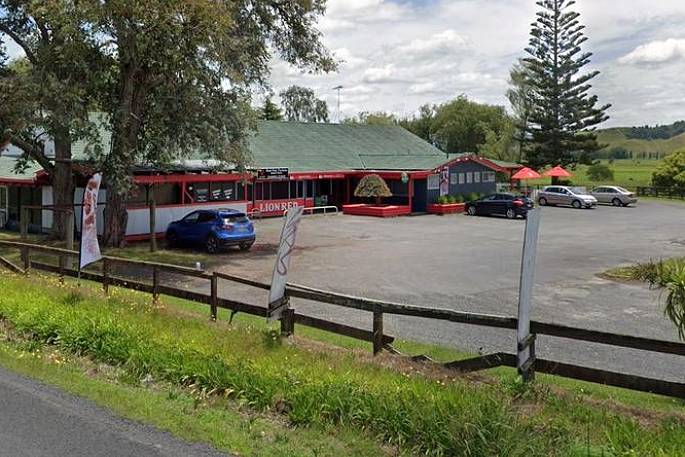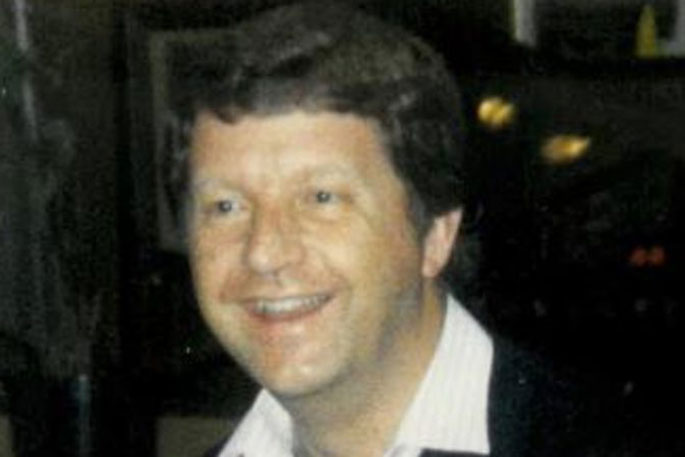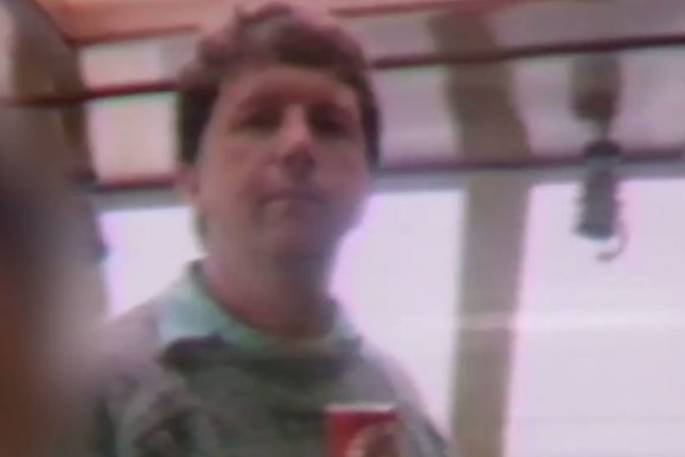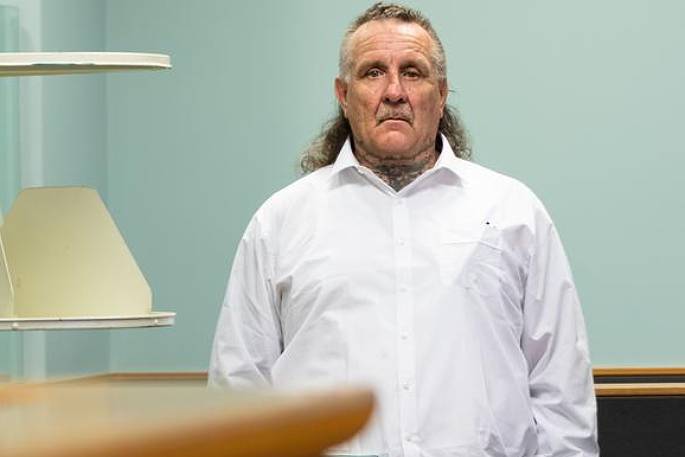More than 30 years after publican Chris Bush was gunned down at the Red Fox Tavern in Maramarua, two men have been found guilty of his murder.
Taurnaga man Mark Hoggart and another man - who cannot be named - have been on trial in the High Court at Auckland for the past seven weeks, charged with murder and aggravated robbery.The men were arrested in 2017, after police began reinvestigating the high-profile cold case in 2016.
It was the third-time-lucky for the investigation team: Hoggart and the other man had been considered the prime suspects in the earlier investigations, but there was never enough evidence to arrest them and lay charges.
During the trial, the Crown said the case against the two men was largely circumstantial - but the evidence pointed to them being the heavily disguised offenders who burst into the tavern late on the night of 24 October 1987.
But the two men denied any involvement in the crime - and their lawyers pinned someone else as being responsible.
And after 18 hours of deliberations, the jury found them guilty.
Before the murder
Chris Bush had gone home for dinner and a bath at about 7pm.
The popular publican had been running the Red Fox Tavern, right on State Highway 2 in Maramarua for a few years.
Locals said he was a top bloke, a no-nonsense sort, a friend to everyone.
"He was everything a back-country barman should be. His pub was the focal point for the whole community," one man told media at the time.
He had a wife, Gay, whom he married in 1968, and two teenage daughters, Jodie, then aged 17, and Penny, who was 15 at the time.
When he came home that night, Jodie told reporters her dad had been in good spirits - he loved his job and he loved talking to his customers.
But it was the last time his family ever saw him.
The robbery
It was pretty quiet at the tavern when Bush went back to work - it was the Saturday night of Labour Weekend.
 The Red Fox Tavern in Maramarua. Photo: Google Maps.
The Red Fox Tavern in Maramarua. Photo: Google Maps.In her evidence during the trial, barmaid Stephanie Prisk said it was mainly locals there, people she recognised, and nothing out of the ordinary.
Last drinks were called at 10pm and everyone had cleared out by 10.30pm.
The front doors were locked and the bar staff started cleaning up. The back door was left unlocked, Prisk said, because that was the way they would go out to the car park at the end of the night.
Bush was in the office, cashing up. When another barmaid Sherryn Soppet went to see him, he told her they should all stick around for a drink.
Once he had finished cashing up, Bush met his staff in the lounge bar.
It was beer for Bush and barman Bill Wilson. The women were poured a kahlua and milk each.
It was just before midnight, they were on to their third round of drinks when it happened.
"That door that was unlocked burst open and two people came in and said 'this is an armed robbery'," Prisk said in court.
One of them had a gun, the other had a baseball bat.
 Photo: Supplied / NZ Police.
Photo: Supplied / NZ Police."Chris [Bush] stood up and walked past me into the lounge, past me some way. Something happened, then there was the explosion, then Chris fell on the floor.
"The gunman was screaming obscenities and yelling and it was crazy and then he said, 'get on the floor, get down on the floor, all of you now down on the floor' and the baseball bat man was over us and we were made to get on the floor."
The now-66-year-old Prisk was asked how she felt, back then, as a 33-year-old mum of three, as it all unfolded.
"Frightened, scared, in shock, bewildered," she recalled.
But the ordeal was not over yet.
The gunman demanded the keys to the safe - which the staff knew were in Bush's pocket.
Prisk had to go and get them - Soppet didn't have her glasses, Wilson was in "total shock", she said.
"There was only one alternative and that was me, so I crawled up the floor to Chris's pockets and searched for the keys."
The man with the bat held his weapon over her as she frantically searched the dead man's pockets.
Once she had, then she was told to go and open the safe, which was in the manager's office - something she had never done before.
Prisk pleaded with the man with the bat not to hurt her - she had three young children at home.
And despite her attempts to open the safe, she couldn't. She did not know which key it was.
Soppet, who was still out in the bar area with Wilson and the gunman, was scared they would be shot next, if the robbers could not open the safe.
After her failed attempts, Prisk was ordered back out to the bar with the others.
Lying face down on the floor, Soppet - who was 37 at the time - could not see much.
Now aged 70, she said she was very scared - this sort of thing did not happen in Maramarua.
Recounting the robbery in court, she said the gunman was kicking Bush's body and swearing at him - she figured in frustration, because the robbery wasn't as easy as he'd thought it would be.
"You f***ing bastard," Soppet said the man shouted at Bush.
The man with the gun ended up going to work on the safe.
Eventually, he cracked it.
"As soon as I heard coin, I thought thank God, we might get out of this," Prisk said.
The man with the bat went to clear the safe of about $36,000 in cash, coins and cheques.
The weight of the silver coins alone was estimated at more than 40kg.
Before the intruders made their getaway, Prisk, Soppet and Wilson were tied up in the bar with yellow twine.
"I remember saying to Sherryn [Soppet], we can't move until we hear a car leave. We waited and there was no car, there was no noise," Prisk said.
"Eventually I said, we're just going to have to make a move," she said. "We have to get help."
Soppet managed to untie herself, then worked to free her colleagues.
Prisk said Soppet called out to Bush at one point, to check he was all right.
"We were hoping he may have just been laying there, I think she called out, but there was no response."
It was Wilson who went to check on Bush.
"Straight away he said to Sherryn and I: 'get out of here, get out of here'.
"We knew we needed to phone straight away to get help."
But Bush never stood a chance.
The pathologist who examined his body said the injuries were unsurvivable.
 A screenshot of Chris Bush as seen in Police Ten 7. Photo: Screenshot / TVNZ archive footage.
A screenshot of Chris Bush as seen in Police Ten 7. Photo: Screenshot / TVNZ archive footage.'This is Maramarua, not Miami Vice'
Bush was a good publican, who was well-liked in the small, rural community.
"He didn't stand no nonsense," Sherryn Soppet's husband, Peter, said in his police statement, which was read to the jury during the trial.
Bush ran a tight ship - and if he wasn't comfortable with someone being at the bar, he had no problem telling them to leave, he said.
Bush wasn't a small man and he didn't stand back - Soppet said looking after his bar and his patrons was his priority.
In the aftermath of the shooting, locals told reporters Bush was a top guy, the sort of person who'd shout his regulars' drinks.
His death was a terrible shock.
"This is Maramarua, not Miami Vice," one man told reporters.
"I watched it all on television news last night but the only thing is, he is a mate of yours - it is all different then," another said.
Locals were scared, too.
"This place is wide open for this. We are country people. There are no police here," one said.
"I had the dog outside last night and every time there was a bark or a car went past, I was looking out the window," another said.
"I hope they get the guys who did it so we can end the whole stinking business," another told a reporter.
The manhunt
In the weeks after the shooting, newspapers carried regular updates about the police investigation.
Detectives feared the killers would strike again - the stolen money wouldn't go all that far.
"I have grave fear that we could have another tragedy on our hands," Detective Chief Inspector Brian Rowe told reporters in the days after the shooting.
A grudge killing was ruled out early on.
"Our inquiries lead us to believe it was just a straight, cold-blooded shooting," Detective Senior Sergeant John Gott said.
Police said known members of the criminal underworld had come forward to help the inquiry.
There was a $30,000 reward for information leading to the identification of Bush's killers.
By mid-November, police had drawn up a list of 80 suspects.
Detectives were working through that list, one by one, and eliminating them.
While the headlines screamed, 'Police hot on trail of Red Fox killer', the reality was the investigation team could not amass enough evidence to lay charges.
That's despite the fact both Mark Hoggart and the unnamed man were interviewed in early 1988 by detectives.
With no arrests made, an inquest was held in November 1989.
In 2000, Bush's killing was re-investigated, but with the same result: no arrests.
It would be another 17 years before the breakthrough, the announcement that two men had been arrested and charged with murder and aggravated robbery.
And on 9 February, 2021, their trial began in the High Court at Auckland.
The Crown case
In her closing address to the jury, Crown prosecutor Natalie Walker said there was one crucial issue in the trial: who were the two heavily disguised offenders who burst into the Red Fox Tavern that night?
"Who was the noticeably shorter gunman, and who was the taller, heavier man with the bat?"
The Crown said it was the unnamed man, with the rough-looking double-barreled sawn-off shotgun, who pulled the trigger and killed Bush.
Hoggart was his accomplice, carrying a bat, who helped subdue the other bar staff and clean out the safe.
The unnamed man was the leader, the one behind the plan, and Hoggart followed, Walker said.
During the trial, the jury was told the unnamed man had committed an earlier aggravated robbery of a tavern in Auckland in the early 1980s.
The Crown said it bore striking similarities to what happened at the Red Fox Tavern, except no-one was killed.
While he was serving his jail sentence, one of his co-offenders in that earlier robbery, Charlie Ross, said the unnamed man talked about committing another "armo" when he got out.
And the Red Fox Tavern would come up in conversation as a possible target - and the unnamed man always seemed to be there.
"There were several occasions where it was spoken about in prison, not only by [the unnamed man], but by most of the other inmates," Ross said.
The shooting and robbery of the Red Fox Tavern happened 17 days after the unnamed man's released.
Ross said when he first heard about what happened, his first thought was that it was the "spitting image" of the earlier armo.
When Ross saw the man a few days later, he said the man told him he'd already got rid of a double-barreled sawn-off shotgun - that Ross had given to him about a week before the Red Fox tavern job - by throwing it into the sea.
The Crown said that gun was the murder weapon.
The man also warned Ross that they could be "getting some heat" and the "cops will be busting our houses" because of their involvement in the earlier robbery.
Ross didn't ask the man if he had anything to do with what happened at the Red Fox Tavern - but the man did ask him for an alibi for Labour weekend.
"My reaction was a total no, I wasn't getting involved in anything," Ross said.
The jury also heard evidence from Philip Dunbier, another witness who'd been in jail with the unnamed man.
They'd met in Kaitoke Prison and by all accounts, they got on well.
Asked what they did together, he said: "Hang out, get stoned, talked about crime, what else do you do in jail?"
They also talked about robberies.
Dunbier said the man told him he had another job lined up once he got out of jail, outside of Auckland.
"Probably a pub, pubs were quite popular then… bit easier than banks," Dunbier said.
Dunbier was released from prison in November 1987.
When he caught up with the unnamed man and Hoggart, he said both of them had "flash new bikes".
He "figured they had done a job and got some money", he said.
Did he ask them where they got the money from?
"You can't have that sort of conversation, 'hey nice bike, where'd you steal the money?' It doesn't work that way," Dunbier said.
Dunbier gave his first statement to police about the Red Fox Tavern on Christmas Eve 1987. He would give further statements to police in early 1988 - and would co-operate with their investigation into the unnamed man and Hoggart.
Once, when he visited the unnamed man in Hawke's Bay in January 1988, he asked him if he did it.
He could not remember the man's exact words, but said he told him: "of course I didn't mate', but with a sort of wink and a nod".
That was not the unnamed man's only hint to Dunbier about his involvement in the crime.
When Dunbier suggested two shotguns would have been better, he said the man told him, "one shotgun and a bat was enough".
The whereabouts of the unnamed man and Hoggart at the time of the Red Fox Tavern shooting and robbery is unknown.
The Crown said the unnamed man appeared to set up an alibi, telling his family he would be away over Labour weekend in Tauranga, or visiting an ex-girlfriend - even though he was meant to be at a family reunion in Napier.
He and Hoggart were seen in Cambridge the day before - Friday - in Hoggart's clapped out green Vauxhall Victor, which had to be push started.
What they did for the rest of that afternoon, no-one knows, but a car matching that description, with two men inside, was seen apparently scoping out Red Fox Tavern about 8.45pm.
The next night, just before midnight, Chris Bush was shot dead and the safe at the Red Fox Tavern was cleaned out.
"Thirty-three years later, the question of whether the game is up is yours and yours alone," Crown prosecutor Natalie Walker told the jury in her closing address.
The defence case
"The wrong people are on trial."
That was how Carla Dawson, one of the lawyers for the unnamed man, opened the defence case.
So if Hoggart and the unnamed man were not responsible, who was?
Almost certainly it was Lester Hamilton, the defence said.
Hamilton died in 2003 and in the early days of the investigation into the Red Fox Tavern shooting and robbery, he was considered a prime suspect, the jury was told.
A prison inmate, called by the defence as a witness, told the court Hamilton - one of his co-offenders in a robbery in 1980 - confessed to him.
They were in jail together, in 1992. Hamilton came into his cell for a joint, the inmate said.
The Red Fox Tavern came up in conversation, and Hamilton told him, "they won't get anybody for that, that's mine and Pete's".
Hamilton went on to say, "the f***ing gun went off, the c*** threw something," the inmate said.
The conversation stopped when other prisoners came into the cell.
Hoggart and the unnamed man were arrested and charged over the Red Fox Tavern shooting and robbery in 2017.
The inmate said he found out some time in 2018 who the man with name suppression is.
"Nah, nah, you got the wrong men, that's what I was thinking," the inmate said.
Under cross-examination, the inmate was asked if Hamilton was a bragger.
"He liked to boast about what he'd done, that was him, that's him bragging, that's him talking," he said.
The inmate was asked if Hamilton made up his confession.
"For me, being with him there at that time and knowing Lester, I believed it to be true," the inmate said.
Giving evidence for the Crown, Detective Senior Sergeant Michael Hayward detailed the extensive inquiries into Hamilton made by the various police investigation teams.
Hayward said he was one of the key lines of inquiry for police in 1987 and his name continued to crop up as a person of interest in years since.
But Hayward said he was ultimately ruled out as a suspect.
Christopher Stevenson, the lead counsel for the unnamed man, said the prison inmate's evidence was a "bombshell"; it was devastating for the Crown's theory of what happened at the Red Fox Tavern and who was responsible for it.
"He came forward because he knows the wrong men are on trial," Stevenson said in his closing address.
"He stood up for truth and justice, that's the only possible reason why he got involved in the case."
Stevenson said the Crown had to blow the possibility that Hamilton was the offender "out of the water".
He asked the jury to consider whether the Crown had succeeded.
Hoggart's lawyer Craig Tuck said there was no evidence in the Crown's case to prove his client was involved.
"While he's been present at this trial, the evidence against him hasn't been here," Tuck said.
There was a complete absence of anything that could be relied on to prove beyond reasonable doubt that Hoggart was the offender who was carrying the bat.
Hoggart, with his 1980s mullet, found himself entangled in the police investigation in 1988 - and remained entangled in it for the rest of his adult life, Tuck said.
There was not enough evidence to find him guilty now, in 2021, just as police found there was not enough evidence to lay charges against him in 1988 or 2000, Tuck told the jury.
But the jury did not buy it.
Outside court, Hoggart's lawyer Tuck said it had been a long and complex trial.
He said he would have to take further instructions from his client about whether there would be an appeal.
The unnamed man's lawyer, Christopher Stevenson, did not comment.
The men will be sentenced in the High Court at Auckland on 7 May.



0 comments
Leave a Comment
You must be logged in to make a comment.